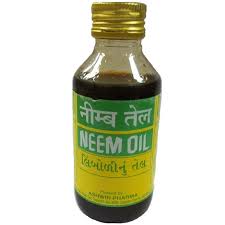Neem oil, cheap remedy for ring worm
Ringworm on the scalp of children is always a cause for concern because of its contagious nature. Children are particularly susceptible to ringworm as contact among children is more frequent between the ages of four and 14 years than in early childhood.
Oftentimes, transmission of ring worm is enhanced by poor hygiene, overcrowding, contaminated hats, brushes, pillows and other inanimate objects. A local barber who used the same barbing equipment has been identified as a major source of infection among students.
In treating ring worm, mothers resort to unsafe practices like the use of alcohol, lime, kerosene, oil and insecticides.
However, herbal medicines and the germicidal properties of certain plants, including the oil extracted from neem seed, have been proven to be cheap and an effective remedy for ringworm.
In the study, scientists asked pupils to apply the oil to the affected region on their head two to three times daily in their homes with the assistance of their parents. The pupils diagnosed with ringworm were randomly selected from public primary schools in Ibadan, Oyo State.
For the period of the study, the dermatologists monitored each of the pupils on who the treatment was administered once a week for a month. At the commencement of the study, the circumference of the skin of each pupil covered with infection was measured with a tape rule before administration of neem oil.
They found a significant reduction in the proportion of skin circumference covered by infection over the treatment period that spanned four weeks. Its effectiveness in the management of the diagnosed infections, however, depended on consistency in the use of the oil.
The scientists, who established the therapeutic effect of neem oil on ringworm in the 2015 edition of the Journal of Medicinal Plant Research, said their findings was consistent with past suggestions that neem oil can effectively control the fungus that causes ringworm.
Given the reduction in the circumference of skin covered with infection before treatment to what was obtained after treatment, they declared, “its use can replace some common unsafe practices in certain parts of Nigeria.”
Given the global change towards the use of non-toxic plant products, they suggested that development of products from neem should be emphasised for the control of various diseases since neem tree is common in our environment and its oil can easily be extracted from its seed.
Studies have shown that neem seed oil has moisturising and regenerative properties, containing Vitamin E as well as essential fatty acids. Some of its chemical constituents like the terpenoids are considered to have antimicrobial and insecticidal properties among many other actions.
Scientific research today validates many of the traditional uses of neem oil. It is used to treat bacterial, fungal, and viral infections, to boost the immune system and to treat many specific health problems.
Among other conditions, neem oil has been historically used to treat the following: acne, eczema, psoriasis, scabies, gingivitis, lice, dandruff, ringworm, wounds, rashes, wrinkles, athlete’s foot, worms, boils and warts.
Similarly, scientists have listed plants that are useful remedies for ringworm in Cross Rivers State to include Senna alanta and Borreria Ocymoides. Senna alata is commonly called ringworm burn or candle bush.
The 2009 study reported in the African Journal of Medicine and Medical Sciences that the local plants were more effective than the conventional drugs used in the treatment of ringworm, thus offering some hope of treatment and control.
These plant extracts were tested on germs that cause ringworm, which were collected from 840 pupils that were screened for ringworm in the communities involved in the study.
The researchers found that the local plants were more effective than the conventional drugs used in the treatment of ringworm, thus offering some hope of treatment and control.
Elsewhere in Nigeria, coconut oil has been attested to as safe and effective for ringworm. Its magic ingredient, especially Lauric acid, is capable of killing many species of fungi. Lauric acid dissolves the fatty outer membranes of the microbes thus killing them.

